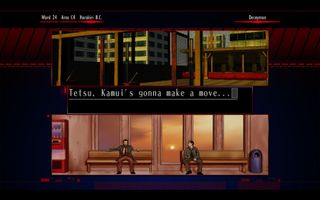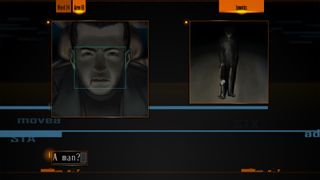Suda 51 on bringing his avant garde adventure The Silver Case to PC
The story of the long-overdue PC version.

How to summarise the games of Goichi "Suda51" Suda? We're talking about a designer whose portfolio resembles a series of controlled explosions at a J-pop convention—from Wii brawler No More Heroes, the tale of a washed-up otaku turned swaggering hitman, to Sine Mora, a diesel punk biplane shooter in which killing enemies adds seconds to the mission clock. Suda's creations aren't always spectacular, but all of them are aggressively and memorably unconventional. So it's great news that at least one of his older games is finally coming to PC—a high-def Steam remaster of the interactive mystery novel The Silver Case, Suda's first project for the PlayStation 1 after he founded Grasshopper Manufacture in 1998.
The Silver Case was localised by Active Gaming Media, and remains an eccentric, moody fusion of cinematic influences and creatively managed limitations. Its story spans two acts, the first written by Suda himself while the second is the work of Moonlight Syndrome writer Masahi Ooka and Sako Kato. The "Transmitter" section casts you as a detective in Tokyo, hot on the heels of a serial killer, while "Placebo" is the story of a journalist covering the investigation.
The game's interface is similarly broken-up: it introduces Grasshopper's now-legendary Film Window storytelling engine, with separate windows for text conversations, VHS footage, animated 2D artworks and 3D environments that allow on-rails movement from marker to marker. The system was thrown together partly in the face of limited resources—the development team numbered just ten people at its largest—but also owes a debt to experimental French cinema.

"The idea comes from the Jean-Luc Godard film Nouvelle Vague," Suda tells me during a discussion of the remaster. "There’s a scene that is expressed in four segments, and I thought of remaking the idea though the concept of a window. This was inspired by the presentation of Japanese variety shows, structured to portray massive amounts of information to the audience." In practice, the interface feels like a lo-fi, CSI-oriented approximation of a Minority Report holographic display, offering frames within frames as you sink your teeth into the plot.
As with many of Suda's later games, The Silver Case's cultural touchstones are incredibly specific, calling on jokes, turns of phrase and mannerisms that can sound nonsensical out of context. Localising the script for English-speaking audiences has taken "a lot of thought and consideration", according to translator James Mountain. "A lot of it was stuff that most players wouldn't really even notice. I had to make judgement calls on swearing, for example—when to use 'fuck' or 'fucking' and when to go with the slightly more tame 'damn' or 'shit'—all of which come out pretty regularly in the dialogue.
"To be even more specific, I had to make sure to keep each character's manner of speaking consistent. The differences in levels of formality or casualness used when Character A speaks to Characters B, C, or D, grammatical idiosyncrasies and stuff like that. The Japanese kanji 己—which can be read as either 'onore' or 'ore'—is used pretty often. This can be problematic, as it can mean one of two things: 'you' or 'I/me', respectively, and depending on the context it can be pretty difficult to work out exactly who the hell the character is referring to."


While Fraser Brown found The Silver Case's strangeness "seductive", he struggled with its "melange of ranting, cursing cops and exhausting stakeout speeches." Read his review in full.
There's also the problem of finding modern equivalents for old-school detective slang—imagine explaining a dialogue line from, say, The Big Sleep to the average Japanese film goer, and you get the idea. "It was lucky that I had sort of grown up watching that kind of thing on TV."
PC Gamer Newsletter
Sign up to get the best content of the week, and great gaming deals, as picked by the editors.
Familiar territory
Mountain is the right translator for the job in part because he was resident in Japan at the time The Silver Case is set. "In 1999, I was 19 years old and had been living in Tokyo on my own for about a year. I spent a great deal of time traversing the city, meeting all sorts of weirdos and unsavoury types, so the localisation really took me back in parts. Oh shit, 'pocket bells' (beepers)! Pink public telephones! I remember those! Also, damn—I'm hella old and I've basically squandered my youth!" Mountain has also enjoyed what he calls the script's "dark sarcasm", saying "It's really rare in Japanese games seeing as how the concept of 'sarcasm' is in general pretty alien here."
Suda has overseen development of the remaster, but resisted the temptation to make significant alterations to the game that started him down the road to being a cult icon. "I had a feeling that I might fall into a state of nostalgia," he confesses. Instead he found he could look back on The Silver Case with fresh sensitivity. "It reminded me of the time when I devoted my energy in every moment towards creativity. The heat of creation was turned up to over 100%, so I shouldn't criticise my past self on that matter."
And as for what comes next? Suda won't be drawn on the subject of additional ports of older Grasshopper games—the odds of an HD Killer7 remake are, alas, low—but is eager to return to interactive mystery novels after a lengthy spell in the action genre. Access to certain much-vaunted new gadgets could be the deciding factor. "I believe that the mystery and suspense genres have a high affinity with videogames—I feel that a large number of gamers pay attention to this genre as well. And I have a strong desire to develop a completely new adventure game on next generation VR devices."
Most Popular



